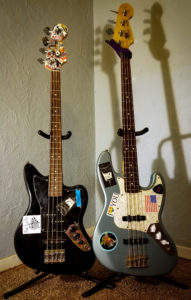By Alex Johnson
amjohnson@lc.edu
Hi, my name is Alex.
Hi, Alex!
And I’m a bass player.

While most stringed instrument fanatics would prefer to call themselves a “guitar player who can play bass” (or just a guitar player) I’ve always been happy being a “bass player who can play the guitar”. I’ve been a bass player for about 14 years and have played and owned a variety of bass guitars. My personal favorite, an early 2000s MIM Fender Jazz, has been with me since the beginning. But a few years ago something caught up with me:
Bad posture.
Years of slouching, poor typing form and even poorer playing form was leading to issues with my hands. Fingers locking up, cramps, twitches, dropping picks and sharp pains in my wrists after even short playing sessions were getting common. A trip to the doctor revealed the issue to be arthritis.
Of course, I worked on my posture and playing form and I started doing hand exercises before and after practice sessions, but that does not undo the damage that’s there. While I could still play my beloved Jazz (and the rest of the existing collection) it’s large 34” scale (neck length) causes fatigue quickly.
At the time this issue was starting I was in a band and needed to endure three to four hour practice sessions. I needed to be able to play for 30 minutes to an hour straight after carrying in a pile of amps, drums and other gear. I needed to be able to record the same part with the same repetitive finger actions over and over and over. I needed help.

Help came in the form of the $180 Squier Vintage Modified Jaguar Bass Special SS (what a mouthful). At a 30” scale versus the standard 34”, the frets are much closer together which means less stretching which means less fatigue. The shorter scale also allows for more slack in the strings; this means you don’t have to press down as hard and you don’t have to pick as hard, this helps both the fretting and picking hand.
Beyond the health benefits, I found the little-bass-that-could to be a lot of fun. On stage it was easy to throw around and move with due to the light weight (and lack of pain). Short scales also have a punchier sound than their bigger siblings and that bite fit right in with the punk band I bought it for.
Today, I’m no longer musically employed. Being able to set my own practice schedule, and continuing with hand exercises, has allowed me to spend time with some of my basses that were neglected while I ran off to party with the little Jaguar. The little bass is still on my guitar rack, still covered in sweat and beer stains, and still ready to jam. It’s there if my hands hurt and it’s there if I just need to spend some time with the memories it holds.




